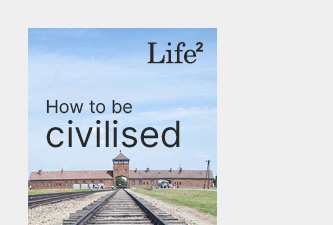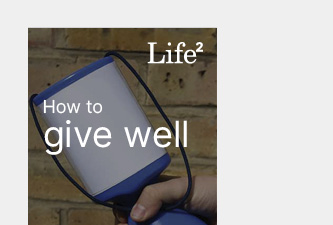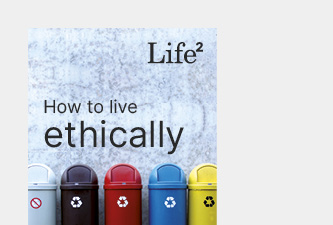Daniel is the author of the bestselling book ‘Emotional Intelligence’, which has sold millions of copies around the world.
His new book ‘Ecological Intelligence’ links with some of the work that we’re doing at Life², so we thought it would be interesting to talk to him and find out more about it.
(Life²) The book is about Ecological intelligence – what is it and why do we need to develop it?
(DG) It is about developing a keen understanding of the ecological consequences of what we do and buy. People have been campaigning about the environment and social justice for some years now but we’ve ignored the hidden impacts of what we buy. We all need to be better informed about the consequences of what we do and what we buy.
How do you suggest that we can develop Ecological Intelligence?
We’re at a cusp in modern society – the era of us not getting information about the products we buy is over. New information technologies and disciplines such as industrial ecology make it possible to know the total impact of any man made object from the beginning of its life cycle until the end. There is a great deal of information available that can help people to compare the products they buy, and this information can be presented in extremely simple ways – for example as a rating or coloured marks on product labels.
How could this information be provided to people?
One example is in America, where a new organisation called Good Guide helps people to understand the impact of 65,000 products. It is just proof of the concept at the moment. It looks at every impact that a product has – from child labour to CO2 emissions, and rates them to enable people to make more profound ethical decisions. It also has an iPhone application, which enables you to scan products at the supermarket to see their rating. Good Guide will be coming to the UK next year.
It provides a definitive aggregator of data relating to ethical impacts – bringing together all the relevant databases with this information, from child labour to GM food.
The Good Guides aims to help you to do 3 things:
1. Know your true ecological impact
2. Favour improvement – i.e. seek products with a better ecological rating
3. Tell everyone you know about it, so that it can create a shift in market share to companies who provide products and services that rate more highly in ecological terms.
Doesn’t your book assume that if you just give people the right information, they will naturally want to buy the most ethical product? Isn’t it just relevant to only a small number of ethically minded middle class people?
No! And I say no for two reasons. First, today’s consumer has been living in a world where there has been no sense of urgency about environmental issues. Today’s kids however are growing up in a world with ecological trauma, and they are therefore far more likely to be motivated to address these problems and use this information. This in turn will have an impact on companies.
Secondly, new technologies will lower the ‘cognitive cost’ of thinking about your ethical choices when you’re buying something. For example, in the US, Walmart has just started using some quite profound measurements to help people analyse the impact of their products, and if these measurements are next to the price tag then you don’t need to make any effort to evaluate the information. We’ve found this works with people – for example in the US the grocery chain Hannaford Brothers put stars next to the price tags of food items to give them a nutritional rating, and they found that people used this information.
But isn’t that example, and many of the other examples you use in the book, focussed on something that we care about already – like our own health? Whereas you’re suggesting that this will make people care about external goals more – like the environment?
As a psychologist, I see that the emotional power lies in protecting oneself and one’s family. The environment is a more abstract thing, but if people start using the information on the basis of protecting things like their family’s health, this is a good start in getting them to look at other areas.
What do you think the impact could be of people developing emotional intelligence – a) on their own lives and b) on key global problems?
I’m keen to introduce a curriculum into schools so kids can grow up with greater sophistication on these issues. There is also a huge entrepreneurial opportunity here, as virtually everything made at the moment is bad ecologically. There is a real opportunity to have entrepreneurship for good – for example, a young person in the US has come up with an alternative to Styrofoam made from natural materials.
Many experts would argue that, whilst it’s a start, ‘transparency’ doesn’t go anywhere near far enough and that to solve our problems we actually need to reduce our resource consumption. How do you think we could do this?
The idea of reduction is built into the system I am proposing. But if we just buy less but don’t pressure industry to have a smaller footprint, then it will still do a lot of damage.
In the book, you seem to firmly believe that the free market can solve the world’s problems. But if the only way to solve some of these problems is to reduce consumption – doesn’t this suggest that the free market is actually the problem rather than the solution, as it is naturally inclined to seek growth and increased consumption?
It was written as a business book. I believe that the free market is a necessary but not sufficient part of making these changes. It’s the current business model that is the problem – I don’t want to see companies closing because we all need income and jobs, but we can get them to operate in a more ethically advantageous way. Consumers looking for a smaller environmental footprint can encourage companies to change their practices.
© Life Squared 2010




